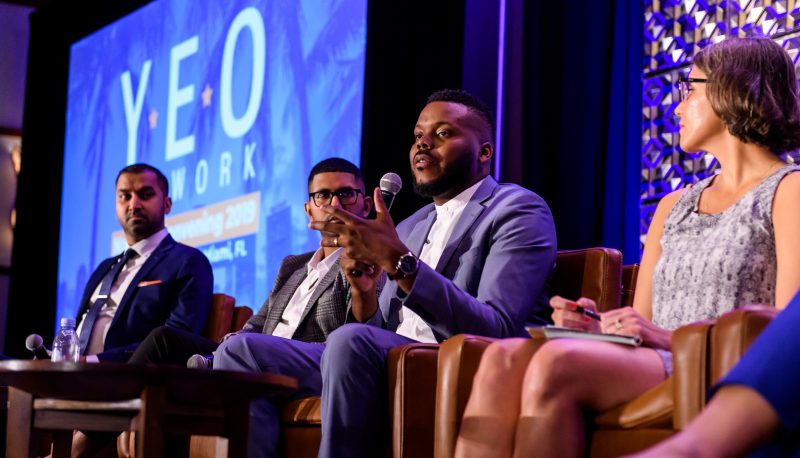Millions of Americans work in the gig economy to make ends meet. Whether it’s TaskRabbit, Lyft, or Postmates, these new platforms are reshaping our workforce. But one problem for workers in the gig economy is that these companies designated them as contractors, and they lack the ability to organize a collective bargaining unit or receive workplace benefits and protections.
At the Young Elected Officials (YEO) Network annual convening in Miami, Fl., the first plenary panel explored the future of work during a time when the economy is being disrupted by the technology industry. The message was clear: The quality of jobs in our economy will continue to suffer until we take action.
“Before we talk robots and automation, we need to talk about today,” said Mayor of Stockton, Calif., Michael Tubbs in his opening remarks. “The economy isn’t working.” We know this, he said, because:
- People are working two and three jobs just to pay their bills;
- The U.S. is facing the highest income inequality since the Great Depression; and
- Americans are keeping jobs they hate just to get health insurance and still going broke paying for medical care.
Anmol Chaddha, a research director at Equitable Futures Lab, added that:
- A majority of Americans can’t come up with $400 in an emergency, despite the lowest unemployment rates in decades; and
- One-quarter of Americans have skipped a prescription, a doctor’s appointment, or procedure because they couldn’t afford it.
This is not what a healthy working economy looks like and the panel discussed the ways policies got us here. Chaddha talked about welfare reform in the 1990s that reshaped social security policy and pushed people into work, including low-wage work. “Now a generation later we don’t need to look at the future of work, but the failure of work,” he said. Today, we trust corporations and the private sector more than the government to take care of society’s issues, said Jane Kim, PFAW Foundation senior fellow and former city and county supervisor of San Francisco, Calif., who moderated the panel. It used to be the opposite, but “over decades, an intentional effort by conservative think tanks has taken place to disrupt that relationship of trust,” said Kim. As tax cuts take place, the government provides fewer services, which further perpetuates the idea that government cannot address society’s problems. “I’m scared of a world where tech companies are solving public problems because the transparency and accountability isn’t there,” she said. “Companies are making decisions without input from the community.” The question for the young elected officials in the room: “How do we disrupt through public policy initiatives?”
Dr. Carmen Rojas, the co-founder and CEO of The Workers Lab, made it clear early in the panel session that issues around the gig economy are not, in fact, the problem, but a symptom of our broken economy. The way the social safety net and companies were set up, she said, left out the majority of Black and Latino workers, including servers, domestic servants and farmworkers. “The people who work the hardest get paid the least, but in our national narrative the poor are lazy,” said Mayor Tubbs. In fact, many of the workers that our economy relies on are not living with support and dignity.
“The gold standard for jobs in America has long been manufacturing,” said Tubbs. “But 100 years ago that would have been insane to think, because of the poor working conditions, low pay, and bad safety standards that were the norm before new rules were enacted by collective action. There’s nothing inherent about making a car that is particularly ‘good’ work,” he continued. “We could do the same with care work, domestic work, and gig work — we can make them into better jobs.”
Dr. Rojas believes we can accomplish these structural changes, but elected officials must adopt a similar mentality as the technology organizations who “break the rules and then rewrite the rules.”
“The policies we put in place will shape the economy, it is not predetermined,” said Chaddha.

Policies like the one Kim wrote and passed as a city and county supervisor in San Francisco, Calif., made the minimum wage $15 with no exceptions around tipped work. Mayor Tubbs is also testing a model for a “guaranteed income” in Stockton, Calif. “People shouldn’t be struggling for necessities — shelter, food, utilities,” he said. Mayor Tubbs and Vikrum Aiyer, the vice president of global public policy and strategic communications at Postmates, proposed portable benefits or decoupling benefits from employment because people should have access to paid leave and health care — and dignity — no matter their job.
Dr. Rojas also called out how important it is for elected officials to understand technology’s impact on our economy. Unfortunately, that’s not what we’re seeing, particularly on the national level. “Our representatives are at best tech illiterate and at worst they are tech negligent,” she said. Aiyer said that there is very little accurate data on the gig economy. “And the vast number of voters are also economy illiterate,” noted Dr. Rojas. “We can’t solve these issues until we understand them,” said Aiyer.
